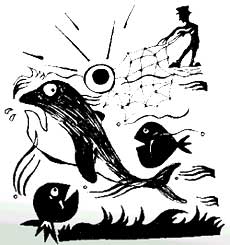Alarming nets
 FISHING nets could trap and kill porpoises that venture near the shore in search of a fish dinner. Such an occurrence was getting rather common along the shores of New England in the us. To stem this, wildlife scientists, environmentalists, engineers and fisherfolk got together to find a technical solution to the problem. Their efforts have resulted in an underwater acoustic alarm called a pinger which, when mounted on a net, would prevent porpoises from entangling themselves without scaring away fish that are targetted (Scientific American, Vol 275, No 3).
FISHING nets could trap and kill porpoises that venture near the shore in search of a fish dinner. Such an occurrence was getting rather common along the shores of New England in the us. To stem this, wildlife scientists, environmentalists, engineers and fisherfolk got together to find a technical solution to the problem. Their efforts have resulted in an underwater acoustic alarm called a pinger which, when mounted on a net, would prevent porpoises from entangling themselves without scaring away fish that are targetted (Scientific American, Vol 275, No 3).
Acoustic deterrents had earlier been rejected by some scientists. "We had been blinded by the literature that said they did not work,' admits Scott D Kraus, a marine biologist with the New England Aquarium at Boston. Despite the criticism, members of an informal
Related Content
- Net zero stocktake 2022: assessing the status and trends of net zero target setting
- State of Green Business 2022
- Gauging economic consensus on climate change
- Global Futures:Modelling the global economic impacts of environmental change to support policy-making (Technical report)
- A tale of two continents: fighting inequality in Africa
- Forests shrinking fast
